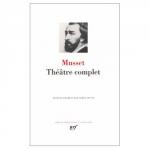|
This section contains 5,351 words (approx. 18 pages at 300 words per page) |

|
SOURCE: Hamilton, James F. “Mimetic Desire in Musset's Lorenzaccio.” Kentucky Romance Quarterly 32, no. 4 (1985): 347-57.
In the following essay, Hamilton elucidates patterns of imitative desire in Musset's Lorenzaccio, linking these structural elements with the drama's themes of disillusionment, futility, and sexual ambivalence, as well as with character motivation in the work.
“Pour comprendre l'exaltation fiévreuse qui a enfanté en moi le Lorenzo qui te parle, il faudrait que mon cerveau et mes entrailles fussent à nu sous un scalpel.”
(III, 3)1
In the above passage, the hero challenges us to probe the motives of his obsessive desire. Lorenzo de Médicis dedicates his life to the accomplishment of one feat, the murder of his cousin and constant companion, Alexandre, the Duke of Florence. Musset's insistence upon the sexual exploits of the Medici scions and the underlying tension of their sibling rivalry pushes the text beyond a historical accuracy assured by...
|
This section contains 5,351 words (approx. 18 pages at 300 words per page) |

|


